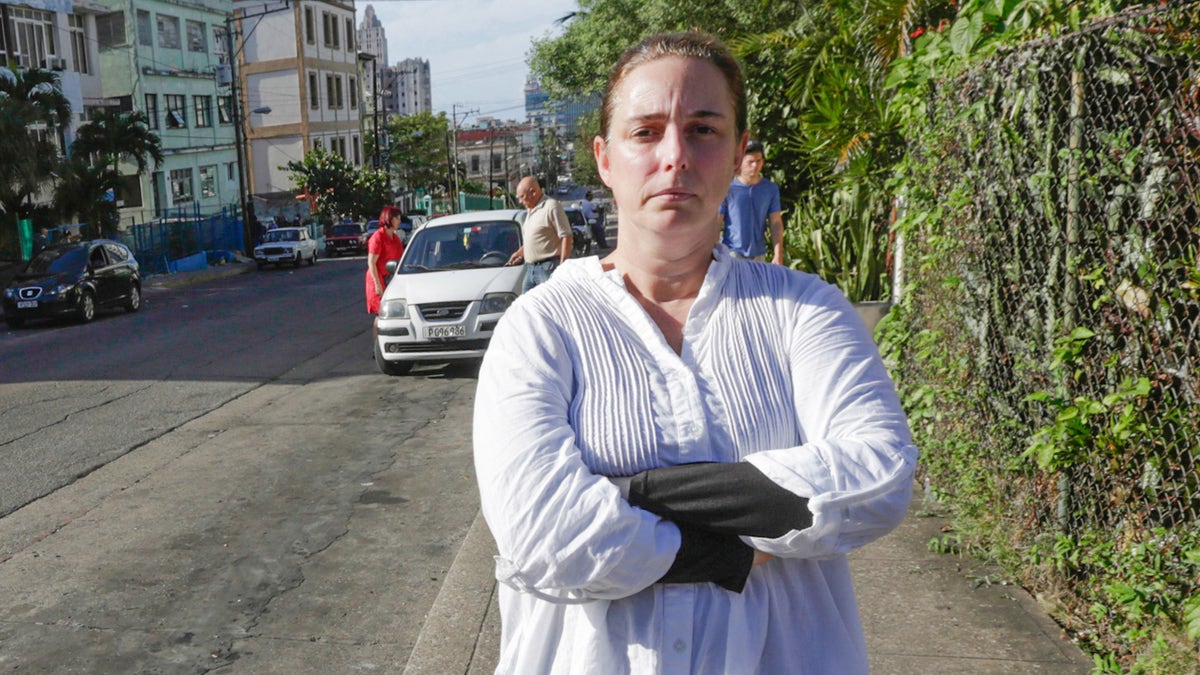
Cuban performance artist Tania Bruguera poses for a picture in a street of Havana, on December 31, 2014, upon her released from a police station.
The headlines around the world, which focused on her plight for a few days last year, have moved on to other topics.
But Tania Bruguera, a 46-year-old performance artist and the first person to publicly test the tolerance level of the Cuban government following the announcement last December that Cuba and the United States were restoring diplomatic relations – remains detained on the island, accused by its regime of inciting public disorder.
Bruguera, a Cuban national whose work is known internationally, is in Havana, on conditional release from jail, while authorities determine what steps they will take against her.
She is confined to the city, where she is staying in her mother’s apartment, and trying unsuccessfully to find a lawyer willing to take on the regime.
“All the lawyers here, in one way or another, work for the state and are accountable to the state,” Bruguera said in a telephone interview with Fox News Latino. “My case would inevitably become a debate about the political system here, the freedom, or the lack of freedom, to express yourself. What lawyer wants to do that in Cuba? It puts them in peril of losing their job, or worse.”
Bruguera says she was heartened when President Barack Obama and President Raúl Castro announced a new era in the relations between the long-time enemy nations.
“I got caught up in the news, the possibilities it suggested about a new openness here, so I thought it would be a good idea to bring to the ground level, the level of the Cuban people, what seemed to be beginning to happen at the government level between Cuba and the United States,” Bruguera said.
She thought she’d help that happen by inviting all Cubans, of all ideologies, to participate in a sort of performance art.
She placed an open call to Cubans – from dissidents to Communist loyalists and everyone in between – to talk about their hope and vision for the country, which would have amounted to a sea-change from the fear of expression that had paralyzed citizens for so long.
Bruguera, who has lived outside of Cuba for long portions of her life – usually wherever her artistic projects have taken her – says she discussed with authorities her plans to have an open mike in Havana and was told not to deal with dissidents.
“I wasn’t doing anything covert, this was not intended by me to be subversive,” she said. “It was completely above-board and hopeful. I saw it as a positive thing. It wasn’t meant to be a protest against the government, that is why I made sure also to include people who support the Communist system and the government here.”
The event, planned for the iconic Revolutionary Square in Havana, wasn't allowed to take place, and Bruguera was arrested.
She has been released then detained several times since – some of those arrests coincided with times that she planned to speak to reporters about her experience.
“If the government was really turning a corner, really going into a new era, they would have welcomed this event that I was planning as something that would have been in their favor,” Bruguera said. “It would have showed the world that they were tolerating an event that originated from the people, that was spontaneous, that they were not controlling or staging.”
She is now “free with restrictions,” as she puts it.
Bruguera must restrict her movements to Havana, and she is under surveillance, which covers telephone conversations, she said. She is being kept in Havana for at least 60 days while authorities decide how they will proceed with the charges against her.
Earlier this month, 14 prominent international artists, including Indian sculptor Anish Kapoor and the English painter Howard Hodgkin, published an open letter in the Guardian newspaper condemning Bruguera’s detention on the island and criminal charges.
Bruguera said that as an artist, she availed herself of some types of freedom that her compatriots do not have, such as the freedom to leave the island for her work, and the freedom to live in other countries for stretches and return to Cuba.
But this time, she knows, she hit a nerve.
“Once they feel they’re being backed into a corner politically, and that the political system is being challenged somehow, even if it’s not, they draw the line and crack down,” Bruguera said.
But she has not grown scared.
“I can be stubborn,” she said. “What I did was innocent, even celebratory. The government is too afraid of letting people express themselves. I thought, 'Let’s learn to listen to one another’s different views and learn to tolerate them and live with one another and with one another’s different beliefs.'”
Her mission now has turned into one of fighting for freedom of speech to highlight how despite the veneer of a new openness in Cuba that some thought would come with the thawing of enmity with the United States, the regime remains oppressive.
“This wasn’t what I planned, to be fighting the government and highlighting the lack of freedom,” Bruguera said. “It’s what the regime made my mission. They made it about this when they reacted to something peaceful and positive with a heavy hand, an overreaction.”
Cuban authorities have suggested to Bruguera that they could drop the case if she leaves Cuba and doesn't return.
Bruguera says she refuses to agree to that.
“This is my country, I am Cuban,” she said. “I’m not going to be forced to give up my Cuban citizenship and to go away in silence as the price for being set free.”




